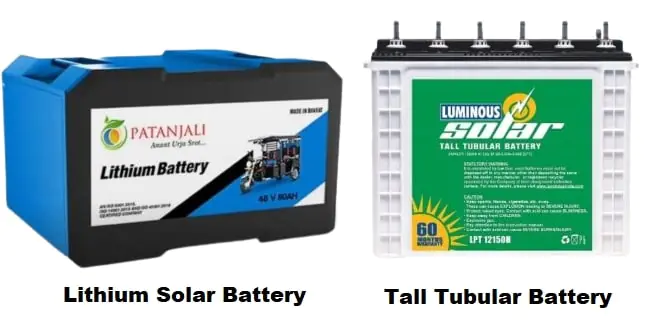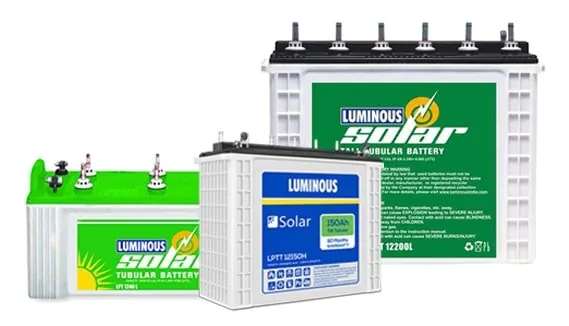Buy Solar Battery System for Home or Business at Best Prices
Introduction
Welcome to this comprehensive guide on solar batteries! In this article, we will explore the world of solar energy storage and delve into the features, benefits, and applications of solar batteries. Solar power is a clean and renewable source of energy, and understanding the role of solar batteries is crucial for maximizing the utilization of solar energy.
Solar batteries allow you to store excess electricity generated by your solar panels for later use, providing energy independence and resilience. In this guide, we will provide you with an in-depth insight into solar batteries, including their types, benefits, installation, and maintenance. Let's dive into the world of solar batteries and unlock the power of solar energy storage!
What is a Solar Battery?
 A solar battery, also known as a solar energy storage system, is a device that stores the excess electricity generated by solar panels for later use. It allows you to store the energy produced during the day and utilize it during the night or when the sun is not shining. Solar batteries provide a reliable and sustainable solution for maximizing the self-consumption of solar energy and reducing reliance on the grid.
A solar battery, also known as a solar energy storage system, is a device that stores the excess electricity generated by solar panels for later use. It allows you to store the energy produced during the day and utilize it during the night or when the sun is not shining. Solar batteries provide a reliable and sustainable solution for maximizing the self-consumption of solar energy and reducing reliance on the grid.
Types of Solar Batteries
There are different types of solar batteries available, each with its characteristics and advantages. Let's explore the most common types:
Price List of Solar Battery
|
Solar Battery Model |
Rating (Ah) |
Selling Price |
|
20Ah Solar Power Battery |
20Ah |
Rs. 2,800 |
|
40Ah Solar Power Battery |
40Ah |
Rs. 3,700 |
|
60Ah Solar Power Battery |
60Ah |
Rs. 4,500 |
|
75Ah Solar Power Battery |
75Ah |
Rs. 6,000 |
|
100Ah Solar Power Battery |
100Ah |
Rs. 7,800 |
|
150Ah Solar Power Battery |
150Ah |
Rs. 11,900 |
|
200Ah Solar Power Battery |
200Ah |
Rs. 12,900 |
1. Lead-Acid Batteries
Lead-acid batteries have been used in various applications for many years and are one of the oldest types of rechargeable batteries. They are cost-effective and reliable, making them a popular choice for solar energy storage systems. However, lead-acid batteries require regular maintenance, including checking electrolyte levels and ensuring proper ventilation.
2. Lithium-Ion Batteries
Lithium-ion batteries have gained significant popularity in recent years due to their high energy density, longer lifespan, and lower maintenance requirements compared to lead-acid batteries. They are lightweight, compact, and offer excellent efficiency. Lithium-ion batteries are commonly used in residential and commercial solar installations, providing reliable and long-lasting energy storage.
3. Saltwater Batteries
Saltwater batteries, also known as sodium-ion batteries, are a newer technology in the realm of solar energy storage. They use a saltwater electrolyte solution, which eliminates the need for hazardous materials found in other battery chemistries. Saltwater batteries are safe, environmentally friendly, and have a long lifespan. While still relatively new, they show great promise for sustainable energy storage.
4. Flow Batteries
Flow batteries are a unique type of solar battery that store energy in liquid electrolytes stored in external tanks. They can be recharged by replacing the electrolyte solution, allowing for virtually unlimited cycling and long-duration energy storage. Flow batteries are known for their scalability and flexibility, making them suitable for both residential and large-scale applications.
Benefits of Solar Batteries
Solar batteries offer numerous benefits, making them a valuable addition to any solar power system. Here are some key advantages:
Energy Independence: With solar batteries, you can store excess electricity and use it during periods of low solar generation or power outages, reducing reliance on the grid and providing energy independence.
Increased Self-Consumption: Solar batteries allow you to maximize the self-consumption of solar energy, using more of the electricity generated by your solar panels and reducing the amount of energy exported to the grid.
Time-of-Use Optimization: By storing electricity during periods of low electricity rates and using it during high-rate periods, solar batteries help you optimize your energy consumption and save on electricity bills.
Backup Power: Solar batteries provide a reliable backup power source during power outages, ensuring continuous electricity supply for essential appliances and systems.
Grid Support and Load Shifting: Solar batteries can be used to support the grid by storing excess solar energy during times of low demand and discharging it during peak demand periods. This helps stabilize the grid and reduce strain during peak usage times.
Installation and Integration
Installing a solar battery requires careful planning and integration with your existing solar power system. Here are the key steps involved:

-
System Assessment: Evaluate your energy needs and solar panel system capacity to determine the appropriate size and type of solar battery for your requirements.
-
Battery Selection: Choose the type and capacity of the solar battery that aligns with your energy needs and budget. Consider factors such as battery lifespan, depth of discharge, and compatibility with your solar inverter.
-
Installation and Wiring: Install the solar battery in a suitable location, following the manufacturer's guidelines and any applicable regulations. Connect the battery to your solar inverter and electrical system, ensuring proper wiring and connections.
-
Monitoring and Control: Set up a monitoring and control system to track the performance and status of your solar battery. Many batteries offer smart monitoring features that allow you to monitor energy flow, battery state of charge, and system efficiency.
-
System Integration and Configuration: Integrate your solar battery system with your solar panels, solar inverter, and other components. Configure the system to optimize energy usage, backup power settings, and grid interaction if applicable.
It is recommended to work with a professional solar installer for the installation and integration of your solar battery system. They have the expertise and knowledge to ensure a safe, efficient, and properly functioning setup.
Monitoring and Maintenance
Regular monitoring and maintenance are essential to ensure optimal performance and longevity of your solar battery system. Here are some key aspects of monitoring and maintenance:
Monitoring System Performance: Utilize the monitoring features provided by your solar battery system to track energy production, energy consumption, battery state of charge, and overall system efficiency. Monitor for any potential issues or abnormalities.
Battery Maintenance: Follow the manufacturer's guidelines for battery maintenance, including periodic checks of battery health, electrolyte levels (for lead-acid batteries), and proper ventilation. Ensure the battery remains in optimal condition for maximum performance.
Temperature Control: Maintain suitable operating temperatures for your solar battery. Extreme heat or cold can impact battery performance and lifespan. Consider implementing temperature control measures such as insulation or ventilation as necessary.
Software Updates: Stay up-to-date with the latest firmware and software updates provided by the battery manufacturer. These updates often include performance improvements, bug fixes, and enhanced functionality.
Professional Servicing: Schedule periodic professional servicing and inspections of your solar battery system. A professional can identify any potential issues, perform necessary repairs or replacements, and ensure the overall health and efficiency of the system.
